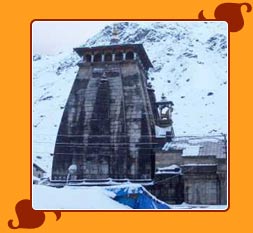TChar Dham is referred to the four Hindu religious sites
in Uttarakhand state of India. These are Yamunotri, Gangotri, Badrinath and
Kedarnath. Nestled in the lap of majestic Himalayas, these four sites are
the epicenter of religious activity in north India. Traditionally, the
Chardham yatra is undertaken from the west to the east. Thus, the yatra
starts from Yamunotri, then proceeding to Gangotri and finally to Kedarnath
and Badrinath. Amongst the four Char Dhams, Yamunotri and Gangotri are
dedicated to goddesses

Yamuna
and Ganga respectively. On the other hand, Kedarnath is dedicated to Lord
Shiva while Badrinath is dedicated to Lord Vishnu. Moreover, people also
visit Hemkund Sahib in the vicinity, which is one of the highest located
religious sites in the country. Thus, pilgrims visit all these places in
aspiration of washing away their sins and to attain salvation, by the
blessings of the Lord. Owing to the significance of this religious circuit,
devotees from all over the world, come here to experience the eternal bliss.
Char Dhams are hustling and bustling with activity during the
summer months, as hundreds of devotees embark upon the holy journey. The
picturesque surroundings of the mountainous region are simply enthralling,
giving the visitors a perfect opportunity to unwind themselves by filling
their lungs with fresh air. Moreover, these otherwise silent and tranquil
locales resound with the names of the Lord as the pilgrims advance towards
their destination.
BadrinathBadrinath Temple is one
of the holiest Hindu shrines in India. It is situated in the hill town of
Badrinath in the Chamoli district of Uttarakhand state. Along the river
Alaknanda, the temple is essentially a Lord Vishnu shrine. Also known by the
names Badri Vishal and Badrinarayan, it is one of the Char Dham sites and
the one amongst 108 Divya Desams.
This has contributed to the fact
that Badrinath is vital with reference to travel and tourism. The gates of
the temple are open only for a period of six months, due to extreme weather
conditions in Himalayas. There are a number of hot water pools here namely
Tapt Kund, Narad Kund etc. These pools are filled with hot steaming water in
the winter months also and are considered to posses medicinal properties.
Many people even perform the last rites of the departed souls at Brahm
Kapal.
It is a flat platform on the banks of river Alaknanda.
Sheshnetra and Chandrapaduka are other rock boulders present along the
river, which are believed to have footprints of Shesh Nag and Lord Vishnu.
Another important temple here is the Mata Murti Temple. These temples are
also considered as evidences of the rich historical past of Badrinath.
Referring the mythological facts, it is believed that Lord Vishnu was
practicing penance at this place.
In order to save him from the
harmful rays of the sun, his divine consort Lakshmi took the form of a Badri
plant and provided shade to him. Pleased by her fervor and devotion, the
Lord told her that this place would be famous by her name. Hence, it came to
be known as Badrinath. Splashed by Alaknanda, the divine site serves as an
ideal location to experience the eternal bliss associated with spirituality.
KedarnathKedarnath is a sacred town situated in the
state of Uttarakhand of India. It can even be called as one of the remotest
Char Dham sites as it is located amidst the snow-capped mountains of
Himalayas, near the river Mandakini. Nestled in the Rudraprayag district,
the main attractions here is the Kedarnath Temple, which is a popular Hindu
shrine and pilgrimage, attracting devotees from all over the world.
The
travel and tourism scope here is strengthened by factors like natural beauty
and religious zest. The Kedarnath Temple is dedicated to Lord Shiva and is
deemed to have been built by Adi Sankaracharya. The glory of the temple can
be attributed to the fact that it is one of the twelve jyotirlingas (Lord
Shiva shrines), present in the country.
The temple remains open
only for a period of six months, due to heavy snowfall in the winter months.
Testing the fervor and dedication of the pilgrims, the temple is not
directly reachable by road. The only way being, a 14 km trek path from
Gaurikund. The present temple stands adjacent to the initial temple built by
the Pandavas. According to historical data, Pandavas after winning the
battle of Mahabharata, felt guilty of killing their own brothers. They came
here in search of Lord Shiva, who kept hiding himself. Finally Bhima, the
strongest Pandava brother recognized him. Lord Shiva, who was disguised as a
bull, escaped leaving behind his hind part.
GangotriOne
of the four sites amongst the holiest places, Char Dham in India, is
Gangotri. This sacred city is located in the northern part of the state of
Uttarakhand. It is known as the source of River Ganges and also the seat of
Goddess Ganga.
Ducked amidst the sprawling Garhwal hills, Gangotri
is an ideal location for all those who wish to take a dip into the oceans of
divinity, as well as those have a thirst for adventure. This makes Gangotri
an ideal spot in terms of travel and tourism. Gangotri also has a strong
historical past and bears the eternal feel of antiquity.
According
to mythological records, King Bhagirath did penance here, after which, as
per Lord Shiva's wishes, River Ganges came down on earth. However, to save
the earth from the fierce force of the river, Lord Shiva held her in his
locks. Thus, river Ganges is also known as Bhagirathi here. Moreover, it is
also believed that Pandavas came down to this place to perform Deva Yajna.
YamunotriPerched amidst sprawling Garhwal Hills,
Yamunotri is another revered pilgrim spots in the state of Uttarakhand. It
is one of the Char Dham in India and holds great religious importance.
Yamunotri is the source of sacred river Yamuna and also the abode of goddess
Yamuna. It is famous for its thermal springs, glaciers and scenic locales.
In effect, it is one of the must visit places from travel and
tourism point of view. According to Hindu mythology, this hilly spot was
once the abode of an ancient sage by the name, Asit Muni. Owing to its
legendary significance, thousands of devotees visit this silent yet
hustling-bustling pilgrimage place. There are a many worth visiting places
here, one of the most important being the Yamunotri temple. This temple was
built by Maharani Gularia of Jaipur in the 19th century. The shrine is
dedicated to goddess Yamuna.






 Yamuna
and Ganga respectively. On the other hand, Kedarnath is dedicated to Lord
Shiva while Badrinath is dedicated to Lord Vishnu. Moreover, people also
visit Hemkund Sahib in the vicinity, which is one of the highest located
religious sites in the country. Thus, pilgrims visit all these places in
aspiration of washing away their sins and to attain salvation, by the
blessings of the Lord. Owing to the significance of this religious circuit,
devotees from all over the world, come here to experience the eternal bliss.
Yamuna
and Ganga respectively. On the other hand, Kedarnath is dedicated to Lord
Shiva while Badrinath is dedicated to Lord Vishnu. Moreover, people also
visit Hemkund Sahib in the vicinity, which is one of the highest located
religious sites in the country. Thus, pilgrims visit all these places in
aspiration of washing away their sins and to attain salvation, by the
blessings of the Lord. Owing to the significance of this religious circuit,
devotees from all over the world, come here to experience the eternal bliss.